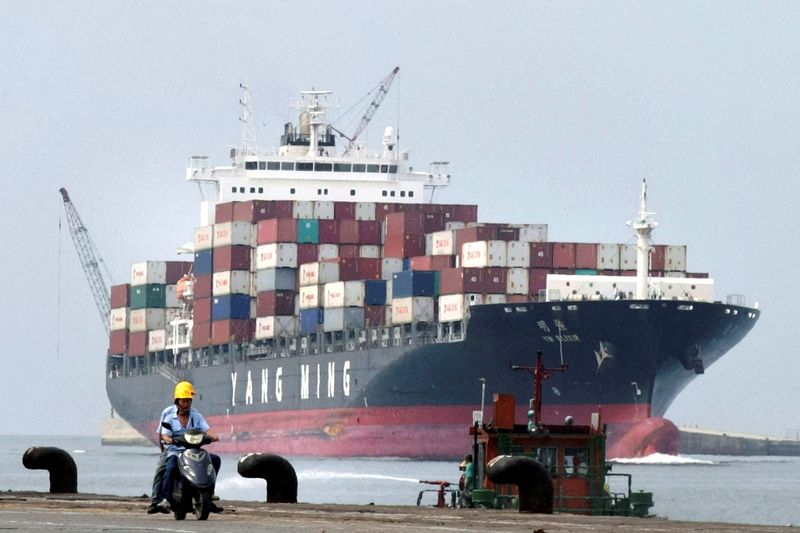By Kate Abnett
BRUSSELS (Reuters) - The European Union, Canada, Japan and climate-vulnerable Pacific Island states are among 47 countries rallying support for a charge on the international shipping sector's greenhouse gas emissions, documents reviewed by Reuters showed.
The documents, being discussed at an International Maritime Organization (IMO) meeting now entering a second week, outline four proposals with a combined 47 backers for imposing a fee on each tonne of greenhouse gas the industry produces.
Support for the idea has more than doubled from the 20 nations that publicly supported a carbon levy at a French climate finance summit last year.
"I'm very confident that there's going to be an economic pricing mechanism by this time next year," IMO Secretary-General Arsenio Dominguez told a news conference on Monday when asked about the prospects of a carbon emissions levy for shipping.
"What form this is going to have and what the name is going to be, I don't know," he added.
Backers argue the policy could raise more than $80 billion a year in funding which could be reinvested to develop low-carbon shipping fuels and support poorer countries to transition. Opponents, including China and Brazil, say it would penalise trade-reliant emerging economies.
Those countries are competing to win over the dozens of others - including most African nations - that diplomats say have yet to take a firm stance on the issue. The IMO takes decisions by consensus, but can also do so by majority support.
The U.N. agency last year agreed to target a 20% emissions cut by 2030, and net zero emissions around 2050. While countries agreed in talks last week to continue negotiations on the emissions price, an official meeting summary noted they were "split on several issues".
Albon Ishoda, IMO delegate for the low-lying Marshall Islands, said a levy was the only credible route to meet the IMO's goals.
"If this does not get passed, what are the alternatives? Because we've already agreed to certain targets," he said. "Are we going back to the drawing board?"
Shipping, which transports around 90% of world trade, accounts for nearly 3% of the world's carbon dioxide emissions - a share expected to expand in the coming decades without tougher anti-pollution measures.
A proposal tabled by the Marshall Islands, Vanuatu and others - which despite their high reliance on shipping for transport and trade have demanded an emissions levy for years - proposes a charge of $150 per tonne of CO2.
Researchers have said a $150 carbon price could make investments in low-carbon ammonia-fuelled systems economic compared with conventional ships.
"We need a transition of unprecedented scale and speed," Vanuatu's climate minister Ralph Regenvanu said. "Low-cost solutions, hybrid proposals aren't going to do the job."
Another submission - from the 27-country EU, Japan, Namibia, South Korea, industry group the International Chamber of Shipping and others - advocates combining a price on shipping emissions with a global emissions standard for maritime fuel.
An IMO meeting in September serves as a deadline for countries to decide whether to take forward both the fuel standard and an emissions price. A senior EU official said the bloc believes "only the two together can suffice" to meet the IMO's targets.
Diplomats said a fuel standard, at least, is likely to be taken forward.
DISAGREEMENT
China, Brazil and Argentina pushed back on the idea of a CO2 levy in IMO talks last year. A study by Brazil's University of Sao Paulo found a carbon tax on shipping would cut GDP across developing countries by 0.13%, with Africa and South America among the hardest-hit regions.
A Brazilian negotiator said Brazil and other developing countries were seeking a swift energy transition with the least disruptive effects on their economies, especially for countries that rely on sea-borne trade.
A proposal by Argentina, Brazil, China, Norway, South Africa, the United Arab Emirates and Uruguay advocates a global fuel emissions intensity limit, with a financial penalty for breaches, as an alternative to a levy on all shipping emissions.
That would mean if countries fully complied with the fuel standard, no emissions would face the fee.
"We will not be in favour of a flat levy likely to hurt developing countries, but we would be in favour of a good levy only applied to the emissions over a certain benchmark," the Brazilian negotiator said.
WIGGLE ROOM
Despite differences of opinion, member states are still attempting to agree on global measures to avoid more countries targeting the industry on a national level. That would fragment the market with varying local standards, and cause a headache for firms shipping goods globally.
The EU for one has said it may bring more international shipping emissions into its local CO2 market if the IMO does not agree a global emissions price by 2028.
Questions over who would administer a charge, and how its proceeds would be reinvested, are also still open.
Diplomats have suggested a compromise could lie in the IMO deciding on a carbon price designed to ensure it would not need to be accounted for as a tax - for example, by designing the policy for the principal aim of cutting emissions, rather than raising revenues.
A proposal by Canada suggests the IMO agree the core design of an emissions price, but delay a decision on how its revenues would be spent - a politically divisive issue that scuppered previous talks.
The Marshall Islands' Ishoda said he hoped disputes over the details would not prevent a deal.
"If we were able to move a mile, we end up moving an inch, because we argue about everything under the sun," he said.
